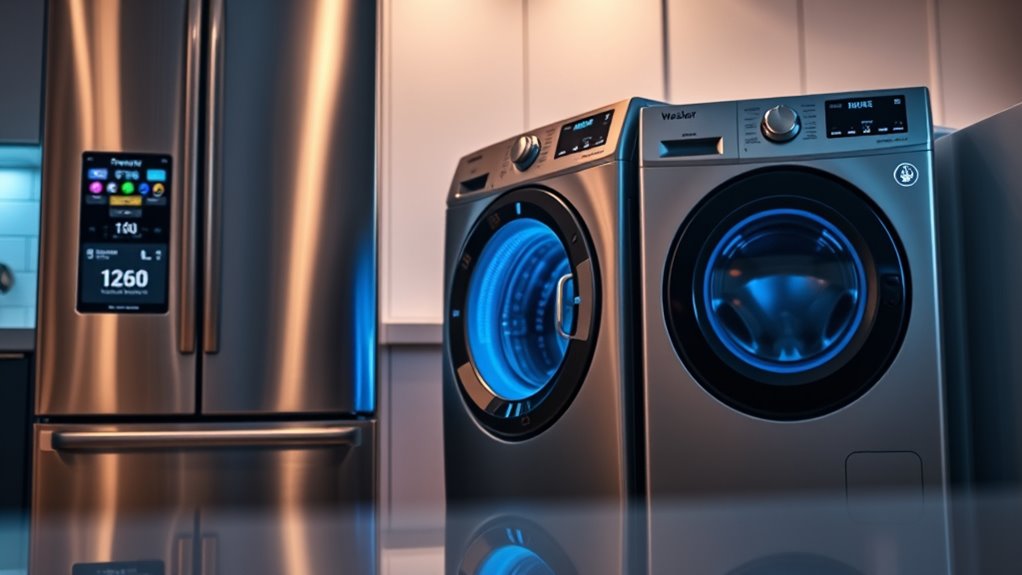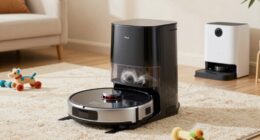Smart appliances monitor their performance using sensors that track motor, temperature, and vibration data. This information is analyzed with advanced algorithms to detect early signs of issues before they become major problems. When a potential problem is identified, your appliance sends you timely notifications via your smartphone or home system, often with troubleshooting tips. If you want to discover how these systems keep your appliances running smoothly and prevent unexpected breakdowns, keep exploring further.
Key Takeaways
- Smart appliances use integrated sensors to monitor performance and detect early signs of potential issues.
- Advanced data analytics analyze sensor data in real-time to identify warning patterns and abnormal behaviors.
- When issues are detected, appliances send notifications via smartphone apps or home automation systems.
- Notifications include specific problem details and troubleshooting guidance for users.
- Systems learn from historical data to improve alert accuracy and optimize maintenance recommendations over time.

Predictive maintenance is revolutionizing how industries manage equipment reliability by forecasting failures before they happen. This approach isn’t limited to factories or large-scale operations; it’s now transforming smart appliances in your home as well. Modern appliances are equipped with sensor integration, which allows them to monitor their own performance in real-time. These sensors continuously collect data on various components, such as motor functions, temperature, and vibration levels. By integrating these sensors, your appliances can detect subtle changes that might indicate an impending issue, often long before a failure occurs. This proactive detection helps prevent unexpected breakdowns, saving you time, money, and frustration.
Once the sensors gather data, data analytics come into play. Advanced algorithms analyze the information in real-time, identifying patterns that suggest potential problems. For example, if your washing machine’s motor starts to vibrate more than usual, the system recognizes this anomaly and assesses whether it’s a sign of wear or imbalance. Data analytics enables appliances to interpret complex sensor data efficiently, distinguishing between normal operation and early warning signs. This process ensures that maintenance alerts are accurate and timely, so you’re not left guessing whether there’s an issue or waiting until something completely breaks down. Additionally, sensor integration plays a crucial role in enabling these predictive features and improving overall appliance performance.
Advanced data analytics interpret sensor data, providing timely, accurate maintenance alerts to prevent unexpected appliance failures.
When your smart appliance detects a potential problem through sensor integration and data analytics, it can notify you directly through your smartphone or home automation system. These notifications are clear and specific, often providing guidance on the nature of the issue and suggested actions. For instance, your refrigerator might alert you about declining compressor efficiency, prompting you to schedule a service appointment before a costly breakdown occurs. This early warning system empowers you to take preventative measures, often with simple troubleshooting steps, instead of facing inconvenient repairs or replacement.
Furthermore, these systems learn from historical data, improving their accuracy over time. As your appliances operate, they gather more information, refining their predictive models. This continual learning process enhances the reliability of maintenance alerts, making them more precise and reducing false alarms. The combination of sensor integration and data analytics not only keeps your appliances running smoothly but also extends their lifespan. By catching issues early and providing actionable insights, predictive maintenance turns your smart appliances into proactive partners, ensuring your home runs efficiently and without unnecessary interruptions.
Frequently Asked Questions
How Secure Is the Data Collected by Smart Appliances?
You might wonder how secure your data is with smart appliances. They use data encryption to protect your information from unauthorized access, keeping your personal details safe. Additionally, manufacturers require your user consent before collecting data, giving you control over what’s shared. While no system is entirely invulnerable, these security measures help confirm your data remains private and secure during interactions with your smart appliances.
Can Predictive Maintenance Replace Traditional Repair Services Entirely?
Predictive maintenance can’t replace traditional repair services entirely, but it considerably reduces downtime through remote diagnostics and maintenance automation. You can address minor issues quickly before they escalate, saving time and money. However, for complex problems, human expertise remains essential. While smart appliances handle routine monitoring, skilled technicians are still needed for repairs beyond automation’s scope, ensuring thorough care alongside predictive maintenance technology.
What Are the Costs Associated With Installing Smart Maintenance Systems?
You’ll find that installation costs for smart maintenance systems vary based on the complexity of the setup and the appliances involved, typically ranging from a few hundred to a few thousand dollars. Maintenance expenses are usually lower over time since these systems help prevent major issues, saving you money. Keep in mind that investing in smart tech can reduce long-term repair costs, making it a worthwhile upgrade for your home.
How Accurate Are the Predictive Notifications in Identifying Issues?
Like a trusty oracle, your smart appliance’s notifications are quite accurate, thanks to advanced sensor accuracy. While they rarely misfire, false positives can occur, warning you of issues that aren’t really there. Overall, these systems effectively identify problems early, helping you avoid costly repairs. You can rely on them to give timely alerts, but it’s wise to stay attentive and verify any suspicious notifications.
Are There Privacy Concerns With Continuous Appliance Monitoring?
You should be aware that continuous appliance monitoring raises privacy implications, as your data is constantly collected and analyzed. You might worry about who owns this data and how it’s shared, which can feel invasive. Manufacturers claim data ownership rights often, but it’s essential to review privacy policies. By understanding these aspects, you can better protect your personal information while enjoying the convenience of smart appliances.
Conclusion
Just like a trusted guardian watching over your home, smart appliances now anticipate problems before they arise. With predictive maintenance, you’re no longer in the dark—think of it as having a crystal ball, foreseeing issues and saving you time and money. Embrace this technology, and your appliances become vigilant allies, ensuring your daily routine flows smoothly. As the future unfolds, let these intelligent devices be the watchful eyes that keep your home safe and efficient.









